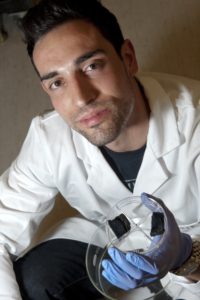 BOFFIN-turned-businessman Daniel Hashim is carving out a name for himself by getting nanotechnology out of the research laboratory and into the industrial marketplace.
BOFFIN-turned-businessman Daniel Hashim is carving out a name for himself by getting nanotechnology out of the research laboratory and into the industrial marketplace.
Dr Hashim’s leading product is a carbon sponge which can soak up oil spills in water. The oil can be stored in the sponge for later retrieval or burned off, allowing the product to be reused. This new material has ground-breaking implications for the future of environmental remediation.
Nanotechnology involves the manipulation of matter on a molecular scale. It is engineering at the atomic level, and the techniques have huge potential to develop new materials which could have applications in many different fields.
The carbon sponge was developed out of work by a nanotechnology research team at Rice University, Texas, in collaboration with labs in the US, Spain, Belgium and Japan. The researchers discovered that adding boron to carbon while creating nanotubes puts kinks and elbows into the molecules which turn them into solid, spongy blocks that soak up oil spilled in water. Dr Hashim describes the nano-sponges as both super-hydrophobic (they repel water and, therefore, float) and oleophilic (they attract oil). They largely consist of air, conduct electricity and can easily be manipulated with magnets.
Other potential applications could include use in making more efficient and lighter batteries; as scaffolds for bone-tissue regeneration, or even as filtration membranes. However, turning pure research into commercial products requires investment and business skills. Readying the new technology for industrial use means finding ways of mass producing large sheets of the nanotubes.
Dr Hashim has stepped out of the laboratory and into the business world to achieve this. His company – CSS Nanotech – bestrides both worlds as he marries academic research with corporate input to create commercial products for industry. He sees the carbon sponge as the first of many pioneering new products.
Dr Hashim’s business is initially focused on commercialising nanotechnology products that can be licensed for use in the oil and gas industry. He sees a role for proprietary nano-materials in providing engineered solutions for use water purification, oil spill remediation, petrochemical refining, and thermal management systems. He is currently seeking a joint venture partner to fund a manufacturing facility.
Hashim is intent on finding ways to apply molecular engineering within industry. The pioneering work of the youthful materials scientist and entrepreneur is slowly being recognized the world over, and is definitely one to watch.




























